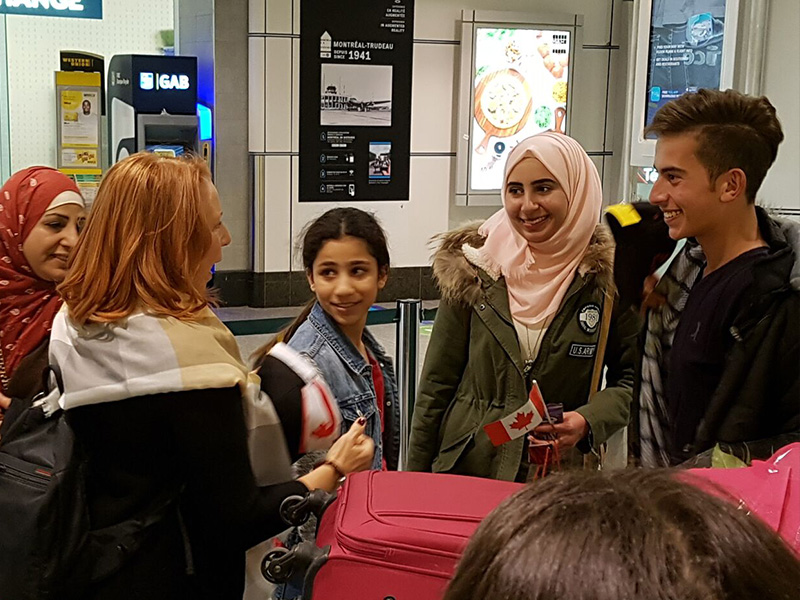Two Syrian brothers separated by the country’s bloody civil war who feared they would never see each other again have been reunited thanks to the generosity and perseverance of members of Temple Emanu-El-Beth Sholom.
Adnan Mahameed, along with the congregation, waited almost 15 months to greet his brother Faker and his wife Ghosran and their four children at Trudeau airport Feb. 27.
The temple is sponsoring the refugee family for their first year in Canada, as well as a second family scheduled to arrive on March 9.
READ: VANCOUVER TEACHER CHALLENGES HOMELESSNESS STIGMA
“It was pretty emotional for everyone when the two brothers hugged each other at the arrivals gate,” said David Berger, co-chair of the temple’s Syrian refugee project.
The temple was one of the first groups in Montreal to step forward to privately sponsor at least one family, even before Prime Minister Justin Trudeau announced Canada’s commitment to welcoming 25,000 Syrian refugees.
‘they are overwhelmed by what complete strangers are doing for them, and quite surprised – whether they are Jewish or not’
In September 2015, during Rosh Hashanah, Rabbi Lisa Grushcow appealed to congregants to mobilize, moved by the photo of the drowned three-year-old Alan Kurdi washing up on the Turkish shore. She reminded them that “the most frequently repeated commandment in the Torah is to care for the stranger, for we once were strangers. Our own history also compels us to offer shelter to those in need.”
The response from the Reform congregation of 900 members was swift. By Yom Kippur, it had raised more than $40,000, and by the end of the month, more than $70,000 – enough to bring in two families. The effort since has been spearheaded by Berger, a lawyer and former MP and ambassador to Israel, and immigration lawyer David Cohen, whose family came to Canada at the turn of the last century fleeing pogroms in Poland.
The temple filed the necessary paperwork with the Quebec government in December 2015 and then waited, knowing the Syrians could arrive at any time, likely on short notice.
Volunteers got busy preparing – collecting and sorting clothing and furniture donations and looking into the family’s employment, educational and healthcare needs. Even the temple’s Torah School students pitched in, filling backpacks with supplies and making cards of welcome.
Finding suitable housing has been the toughest part, Berger said, and the family stayed with Adnan while they searched.
The temple chose the Mahameeds – who are traditional Muslims – through Berger’s connection with McGill University’s International Community Action Network (ICAN). Formerly the McGill Middle East Peace Program, ICAN has over the past 20 years sponsored social work fellows from Israel, the Palestinian territories and Jordan.
In 2014, Adnan Mahameed became the first Syrian fellow. A leader of a group known as the April 17 Movement for Democratic Change, he was arrested three times by pro-Assad forces between 2011-2013 and barely managed to get out of Syria alive, with a wife and four children.
The day after Adnan’s first arrest, Faker fled his home in Daraa to nearby Jordan. Another brother was deported to Sudan, where he remains. Two other brothers were killed in the strife.
Faker, 42, is a pharmacist who owned his own store. Ghosran is a nurse. The children range in age from seven to 18.
Adnan, who plans to begin a PhD in social work at McGill next semester, said his brother and sister-in-law probably were not aware that it was Jewish people who were helping them. “When you are in survival mode, you are just thinking of how to get to a safe place,” he said.
But he said they are overwhelmed by what complete strangers are doing for them, and quite surprised – whether they are Jewish or not.
“I told them that people here feel an obligation to help others, just because they are fellow human beings.”
The family members are in good health, he said, but are affected by the psychological stress they endured for years.
READ: THE JEWISH DUTY TO SPEAK OUT ABOUT SOUTH SUDAN
Adnan, who has been deeply involved in Syrian relief efforts, has himself been deeply touched by the dedication of the temple members, with whom he has worked for more than a year.
“I couldn’t imagine how so many people could have done so much,” he said. “It was not about my family, but our family,” meaning the congregants view them as their own.
Adnan never knew any Jews in Syria and before he came to McGill, he had never had a face-to-face conversation with an Israeli.
“In Syria, we lived in a very closed society. Here we are able to talk openly and freely. It has shifted my view of others. Jews were the enemies, the nation that killed us, who took our land.”
At McGill, he met Israeli fellow Amit Kitain, also in the ICAN program, whom he now considers a close friend.
The project has also resulted in unprecedented communication between the temple and the broader Montreal Muslim community, through Rabbi Grushcow’s outreach efforts.
Berger concurred that the ties between the temple and “their” new family have become personal, and it looks forward helping them get settled and integrated.
“There are Jewish mothers and grandmothers who want to look after them like they were their own kids,” said Berger. “But we have to strike a balance between introducing them to Montreal and Quebec and Canadian society, and being respectful, remembering that within 12 months, they will have to be able to stand on their own.”
The second family that’s expected to arrive on March 9 includes five children aged eight to 18, Berger said. They’re coming from Beirut after fleeing their home in Homs.
“Homs was one of the first cities in Syria destroyed,” Berger said. “They lost everything. They had a house and store, and were quite comfortable.”
They will also be reunited with relatives that have been living in Montreal for about 15 years.








